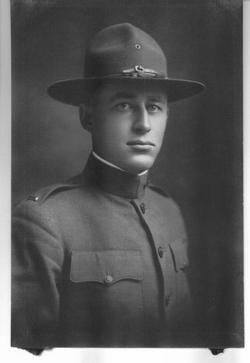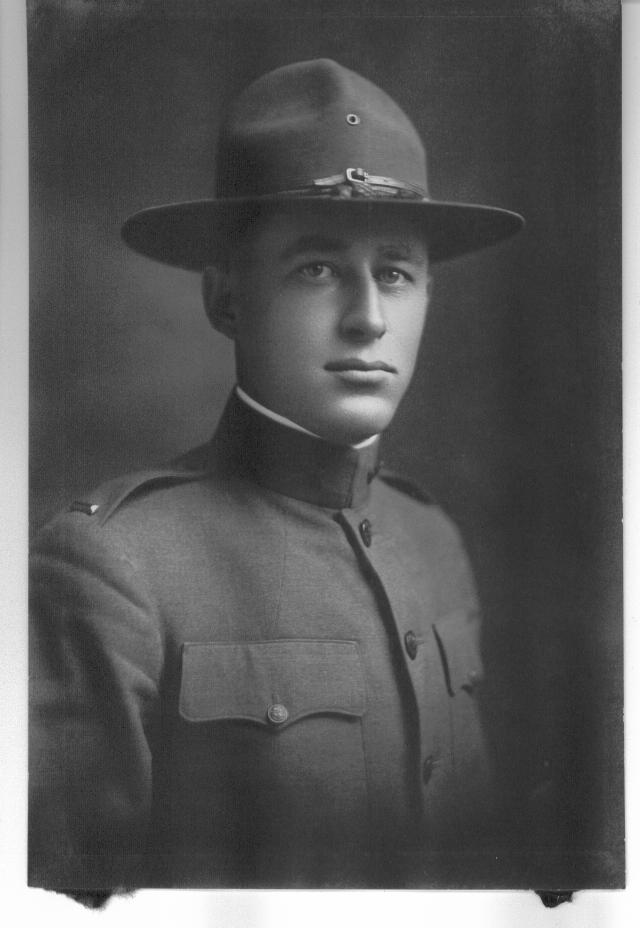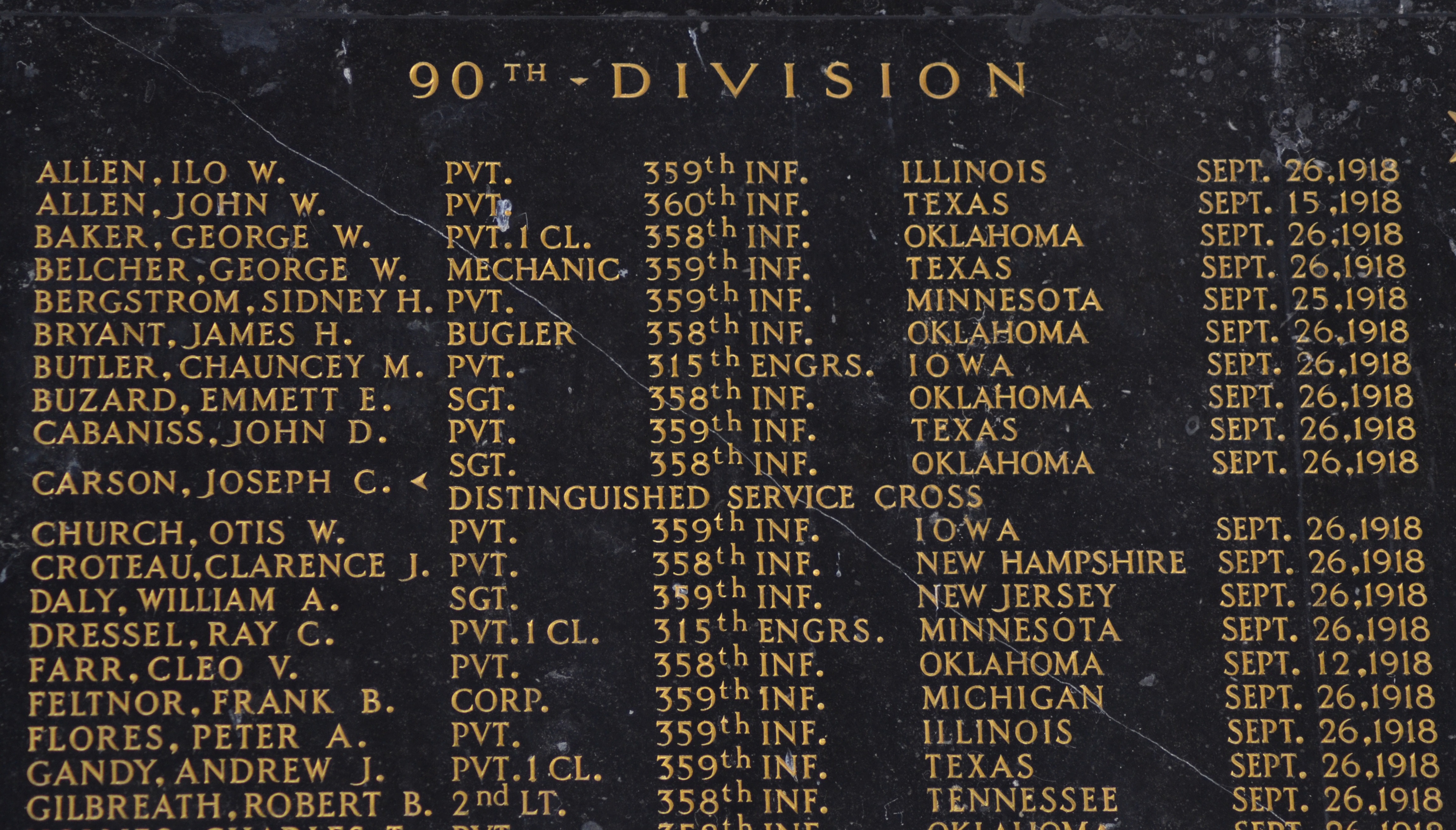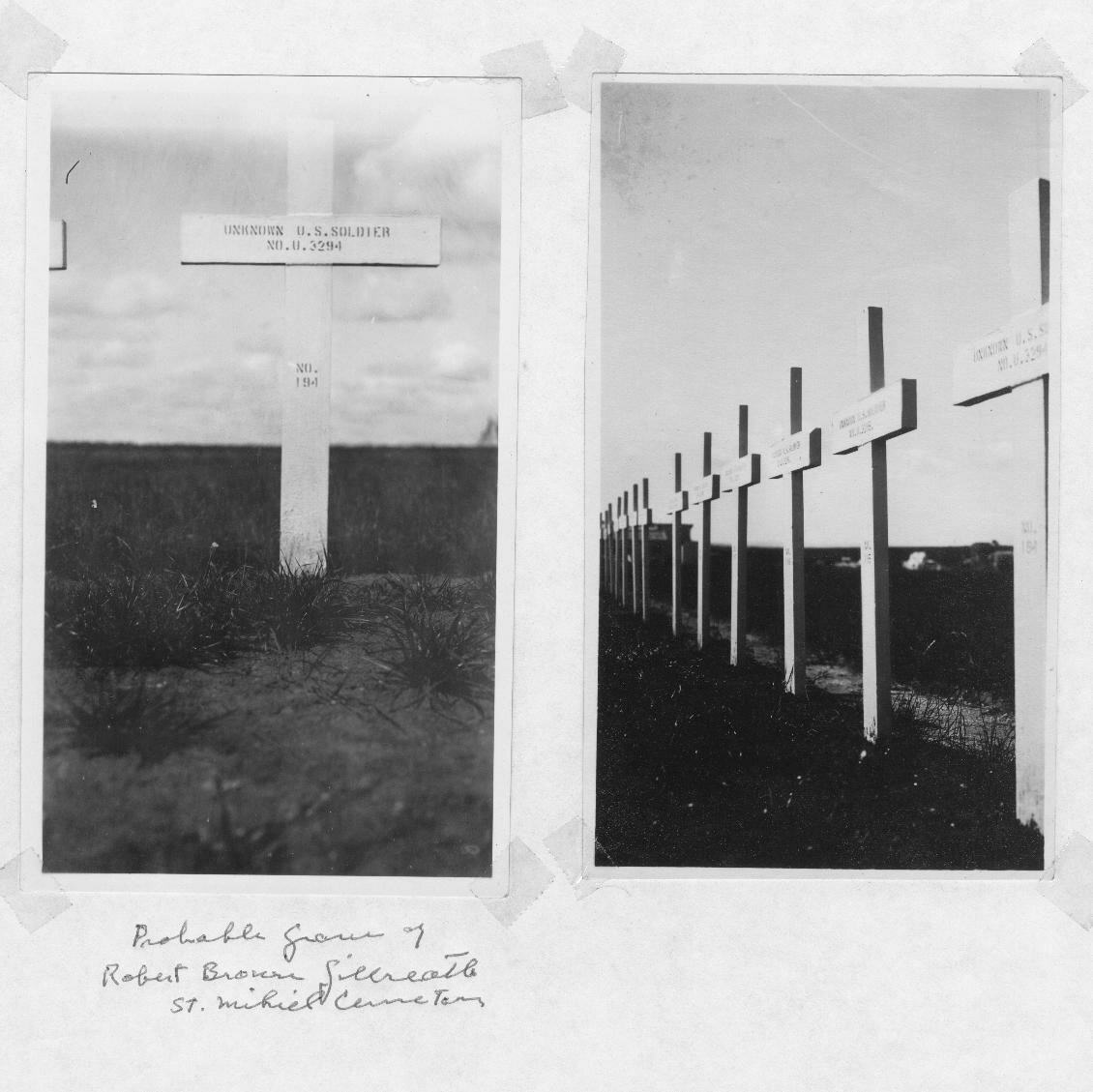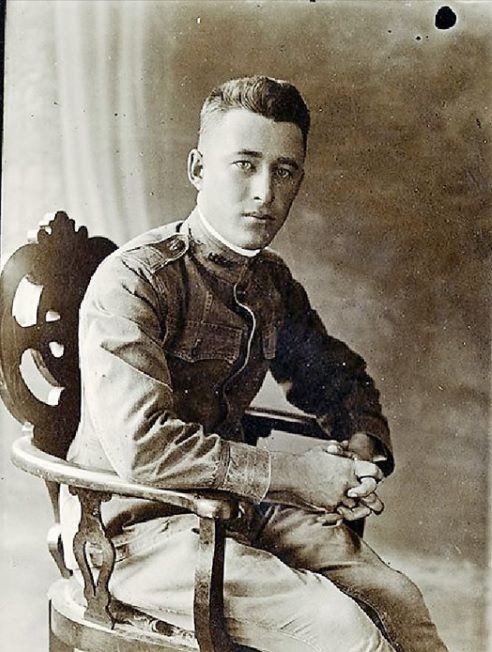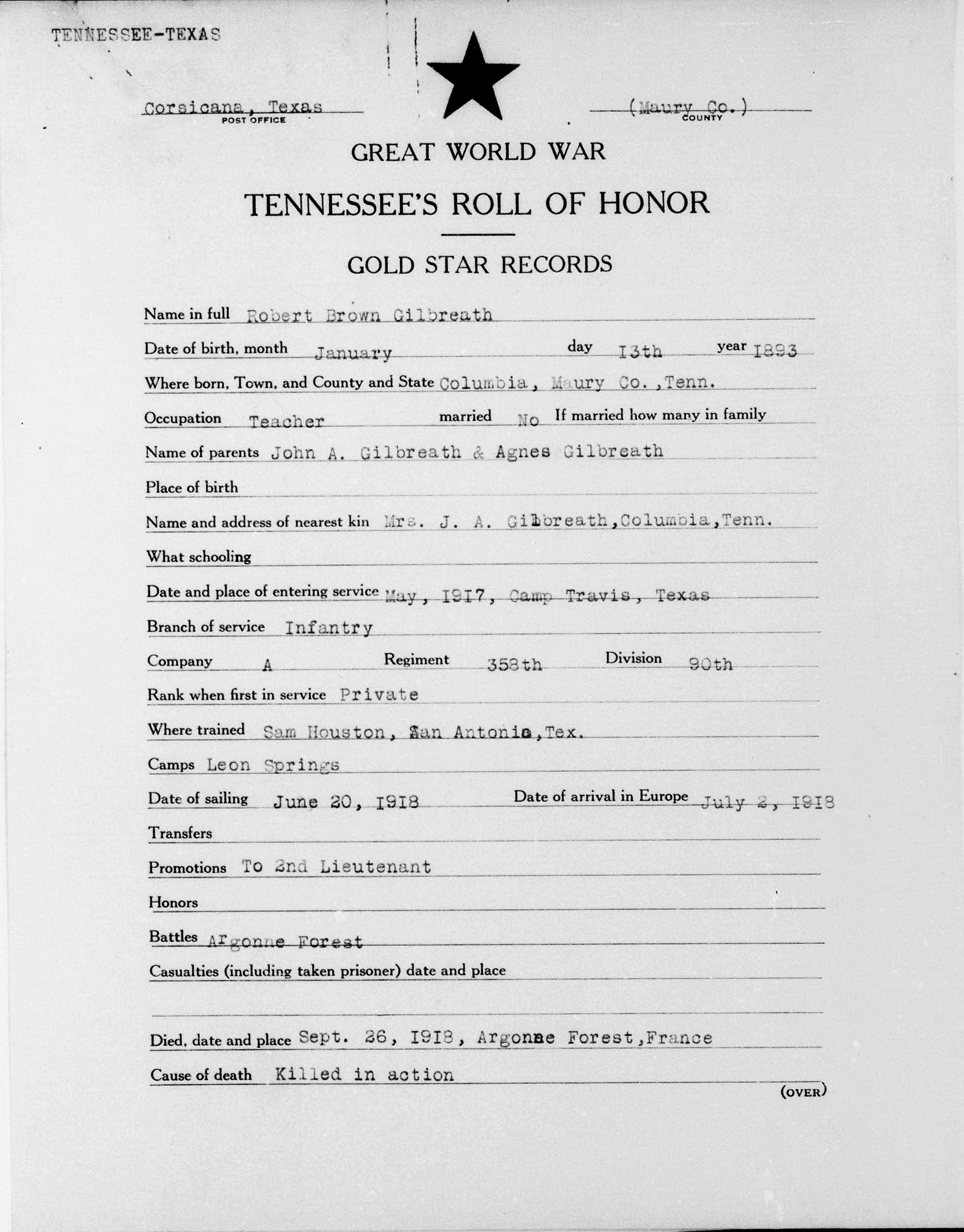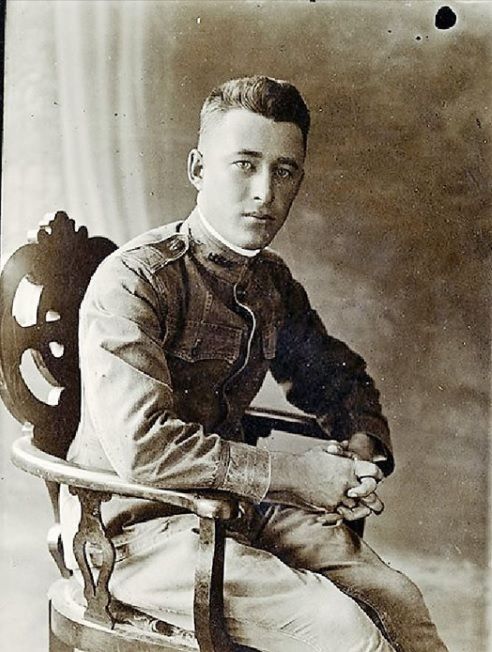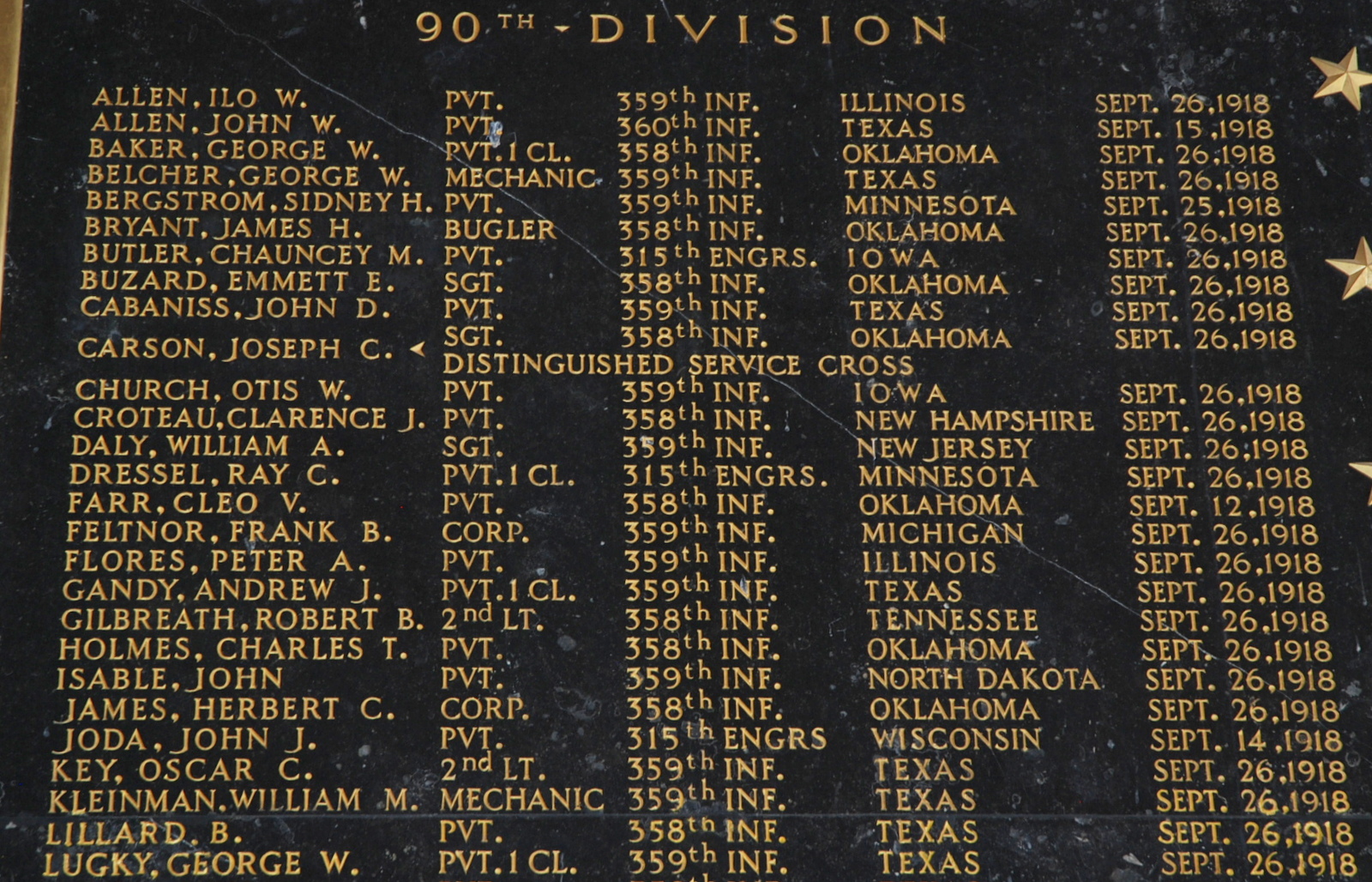Headlines – Columbia (TN) Daily Herald – November 5, 1918 and subsequent days
LT. ROBT. GILBREATH MISSING IN ACTION
Family Has Received Letters Dated Since Report of His Missing
MEMORIAL TO LIEUT. GILBREATH
Appropriate Tribute To One Of Maury County's Heroes
J.H. DINNING SPEAKS
Summary of Life Read by Rev. J. W. Cherry;….Robert Gilbreath Was Model Of Christian Living
LIEUT. ROBERT GILBREATH DIED GALLANTLY ON FIELD OF BATTLE
Hero's Memory Honored – First Methodist Church
LIEUT. ROBERT GILBREATH PAYS WITH LIFE
Brilliant Young Maury Countian Fell With Face To Enemy Few Days Before Signing Of Armistice
The many friends of Lieut. Robert Brown Gilbreath, who have been clinging to the hope that official news from him would correct the recent rumor of his death in action, were shocked Monday when information that is credited as being correct, was received by the stricken family. His friends and family have nothing now on which to base any optimism, and his death is taken as one of the inevitable horrors of war, but is all the more deplorable that the young man was just ready to begin a career of great usefulness when the war started.
The information was contained in a news paper clipping from the Houston Post which was sent Mr. and Mrs. Gilbreath by a friend. The notice was written by Lieut. Frank Liddell, 358th Infantry, 90th Division, of which Robert was a member. According to the letter of Lieut. Liddell, the fighting in which this company was engaged was particularly fierce; only 37 Texans having survived out of the original 250. This fighting took place just a few days before the signing of the armistice. Lieut. Liddell stated that he was the only officer left in the company of original quota and continues, " Capt. Peters was killed the same morning that I was wounded, the Boche got his body, also Lieut. Gilbreath's, that same morning. They were both killed some 150 yards on my left." Lieut. Gilbreath was in Texas at the beginning of the war and received his commission as second lieutenant at Camp Travis, San Antonio, Texas. He arrived in Liverpool on July 4th and immediately went into action. The last letter from him was dated September 24th, and his inability to write was due to the fact that he had been constantly in the fight.
The fighting in which he lost his life was terrific and is further described by Lieut. Liddell as follows: This Division has won itself some reputation, has been congratulated several times by Gen. Pershing and Marshal Foch. We began fighting the middle of August and have been at it continually, except for two or three days when we were moving from St. Mihiel to Argonne Forest. We have been used as shock troops and not one time have we failed to reach our objective, but we have paid. We have been through all the hell there is and now it is rumored that we have been chosen to go into Germany, quite a compliment, though, of course, I think we will go over and quiet things and then we will be relieved and sent home."
But Lieut. Gilbreath will not return home. He has made the supreme sacrifice, the greatest that mortal man can make, and there is consolation in knowing that none were braver than he, and that the enemy saved itself from disaster by removing such as he from the great arena. This young Maury countian was brave, he was courageous, he was inspired by the cause for which his country was fighting; he was not being driven into battle, but with all the force that he could command, he was leading his men face to face with the most despicable enemy that ever cursed the world. He died game, fighting like a lion, and his body was taken by the enemy as a prize.
Few Maury county boys had brighter prospects than Robert Gilbreath. He had a remarkably bright mind and led every class in every school he attended. He graduated with honors from the Columbia High School and later from the Columbia Military Academy. He later attended the University of Texas, and nothing but death could have kept him from the presidency of some great university before he had passed the prime of life. He was a young man of strong character, high ideals and noble purposes, genial and accommodating. He was an inspiration to his associates.
Lieut. Gilbreath is survived by his father and mother; three sisters, Misses Jennie and Verna Gilbreath and Mrs. W. D. Patterson of Columbia; two brothers, Earl, of Trinity College, and Claude, of Gulfport Military Academy, both of whom were in training for commissions when the armistice was signed. He also has six half-brothers.
Headlines – Columbia (TN) Daily Herald – November 5, 1918 and subsequent days
LT. ROBT. GILBREATH MISSING IN ACTION
Family Has Received Letters Dated Since Report of His Missing
MEMORIAL TO LIEUT. GILBREATH
Appropriate Tribute To One Of Maury County's Heroes
J.H. DINNING SPEAKS
Summary of Life Read by Rev. J. W. Cherry;….Robert Gilbreath Was Model Of Christian Living
LIEUT. ROBERT GILBREATH DIED GALLANTLY ON FIELD OF BATTLE
Hero's Memory Honored – First Methodist Church
LIEUT. ROBERT GILBREATH PAYS WITH LIFE
Brilliant Young Maury Countian Fell With Face To Enemy Few Days Before Signing Of Armistice
The many friends of Lieut. Robert Brown Gilbreath, who have been clinging to the hope that official news from him would correct the recent rumor of his death in action, were shocked Monday when information that is credited as being correct, was received by the stricken family. His friends and family have nothing now on which to base any optimism, and his death is taken as one of the inevitable horrors of war, but is all the more deplorable that the young man was just ready to begin a career of great usefulness when the war started.
The information was contained in a news paper clipping from the Houston Post which was sent Mr. and Mrs. Gilbreath by a friend. The notice was written by Lieut. Frank Liddell, 358th Infantry, 90th Division, of which Robert was a member. According to the letter of Lieut. Liddell, the fighting in which this company was engaged was particularly fierce; only 37 Texans having survived out of the original 250. This fighting took place just a few days before the signing of the armistice. Lieut. Liddell stated that he was the only officer left in the company of original quota and continues, " Capt. Peters was killed the same morning that I was wounded, the Boche got his body, also Lieut. Gilbreath's, that same morning. They were both killed some 150 yards on my left." Lieut. Gilbreath was in Texas at the beginning of the war and received his commission as second lieutenant at Camp Travis, San Antonio, Texas. He arrived in Liverpool on July 4th and immediately went into action. The last letter from him was dated September 24th, and his inability to write was due to the fact that he had been constantly in the fight.
The fighting in which he lost his life was terrific and is further described by Lieut. Liddell as follows: This Division has won itself some reputation, has been congratulated several times by Gen. Pershing and Marshal Foch. We began fighting the middle of August and have been at it continually, except for two or three days when we were moving from St. Mihiel to Argonne Forest. We have been used as shock troops and not one time have we failed to reach our objective, but we have paid. We have been through all the hell there is and now it is rumored that we have been chosen to go into Germany, quite a compliment, though, of course, I think we will go over and quiet things and then we will be relieved and sent home."
But Lieut. Gilbreath will not return home. He has made the supreme sacrifice, the greatest that mortal man can make, and there is consolation in knowing that none were braver than he, and that the enemy saved itself from disaster by removing such as he from the great arena. This young Maury countian was brave, he was courageous, he was inspired by the cause for which his country was fighting; he was not being driven into battle, but with all the force that he could command, he was leading his men face to face with the most despicable enemy that ever cursed the world. He died game, fighting like a lion, and his body was taken by the enemy as a prize.
Few Maury county boys had brighter prospects than Robert Gilbreath. He had a remarkably bright mind and led every class in every school he attended. He graduated with honors from the Columbia High School and later from the Columbia Military Academy. He later attended the University of Texas, and nothing but death could have kept him from the presidency of some great university before he had passed the prime of life. He was a young man of strong character, high ideals and noble purposes, genial and accommodating. He was an inspiration to his associates.
Lieut. Gilbreath is survived by his father and mother; three sisters, Misses Jennie and Verna Gilbreath and Mrs. W. D. Patterson of Columbia; two brothers, Earl, of Trinity College, and Claude, of Gulfport Military Academy, both of whom were in training for commissions when the armistice was signed. He also has six half-brothers.
Inscription
2nd Lt. 358th INF. Tennessee
Gravesite Details
Entered service from Tennessee
Family Members
Sponsored by Ancestry
Advertisement
Explore more
Sponsored by Ancestry
Advertisement
